International Students' Skin Cancer Prevention Research Proposal
VerifiedAdded on 2023/03/20
|7
|1359
|47
Report
AI Summary
This research proposal outlines a qualitative study investigating the attitudes and behaviors of international students aged 18 and above at the University of Sunshine Coast regarding skin cancer prevention. The study aims to understand their sun protection practices and exposure to ultraviolet radiation. Employing a constructivist epistemology and social cognitive theory, the research will utilize focus groups and non-probability sampling to gather data through open-ended questionnaires. Thematic analysis will be used to analyze the collected data, with ethical considerations including informed consent and confidentiality. The study acknowledges limitations in credibility and will compare findings with existing literature to ensure quality. The research seeks to inform strategies for promoting sun-safe behaviors within this student population.
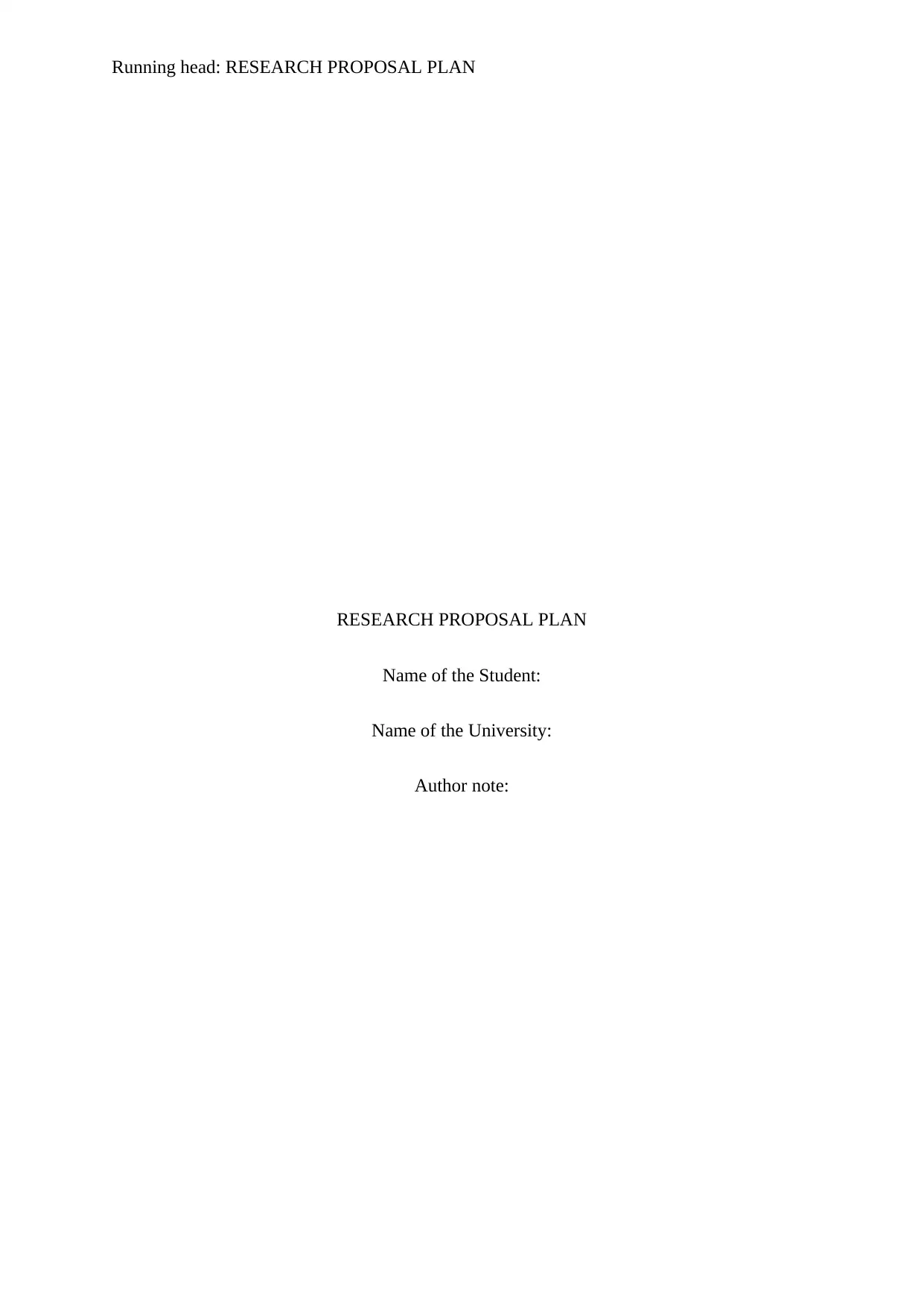
Running head: RESEARCH PROPOSAL PLAN
RESEARCH PROPOSAL PLAN
Name of the Student:
Name of the University:
Author note:
RESEARCH PROPOSAL PLAN
Name of the Student:
Name of the University:
Author note:
Paraphrase This Document
Need a fresh take? Get an instant paraphrase of this document with our AI Paraphraser
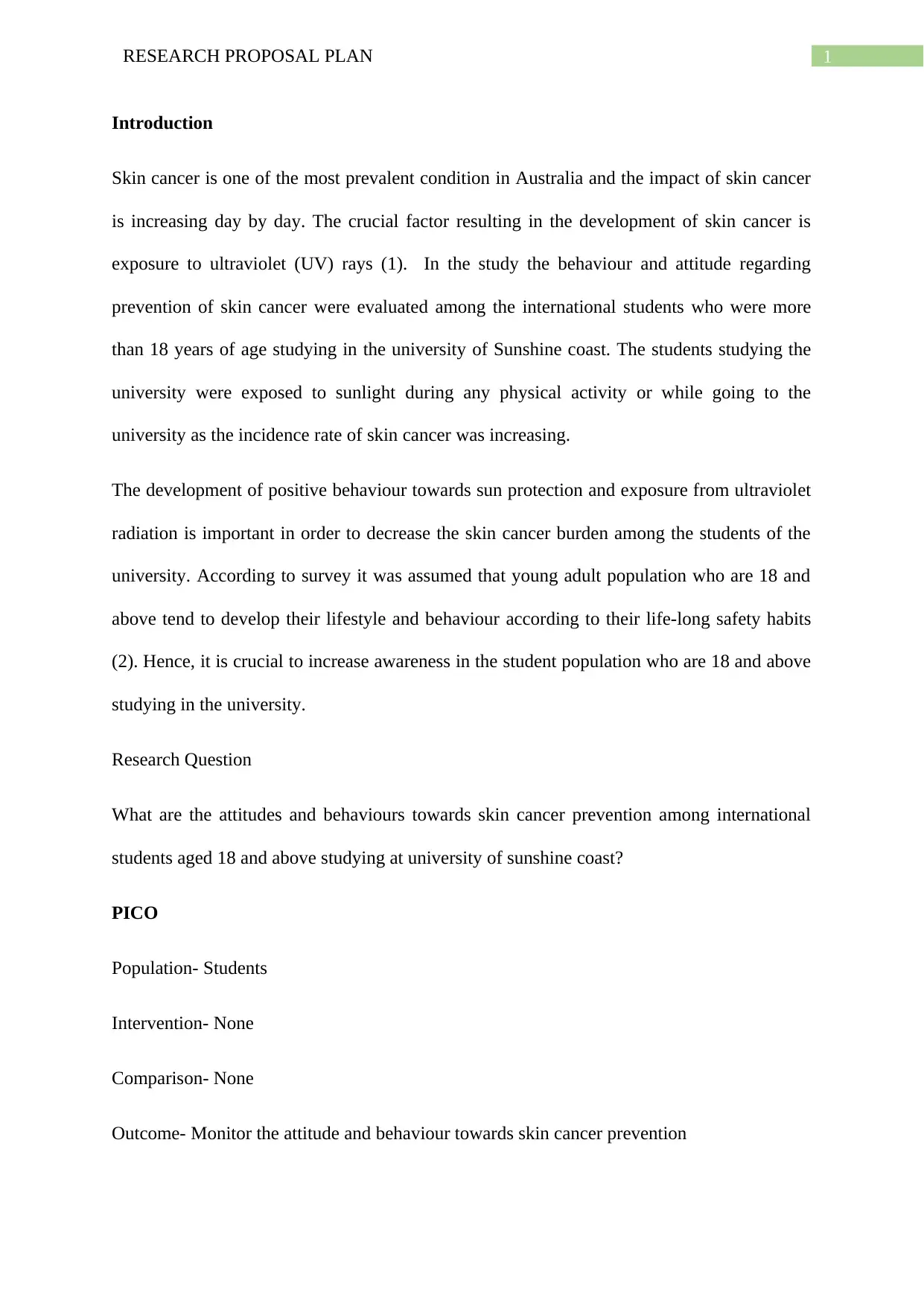
1RESEARCH PROPOSAL PLAN
Introduction
Skin cancer is one of the most prevalent condition in Australia and the impact of skin cancer
is increasing day by day. The crucial factor resulting in the development of skin cancer is
exposure to ultraviolet (UV) rays (1). In the study the behaviour and attitude regarding
prevention of skin cancer were evaluated among the international students who were more
than 18 years of age studying in the university of Sunshine coast. The students studying the
university were exposed to sunlight during any physical activity or while going to the
university as the incidence rate of skin cancer was increasing.
The development of positive behaviour towards sun protection and exposure from ultraviolet
radiation is important in order to decrease the skin cancer burden among the students of the
university. According to survey it was assumed that young adult population who are 18 and
above tend to develop their lifestyle and behaviour according to their life-long safety habits
(2). Hence, it is crucial to increase awareness in the student population who are 18 and above
studying in the university.
Research Question
What are the attitudes and behaviours towards skin cancer prevention among international
students aged 18 and above studying at university of sunshine coast?
PICO
Population- Students
Intervention- None
Comparison- None
Outcome- Monitor the attitude and behaviour towards skin cancer prevention
Introduction
Skin cancer is one of the most prevalent condition in Australia and the impact of skin cancer
is increasing day by day. The crucial factor resulting in the development of skin cancer is
exposure to ultraviolet (UV) rays (1). In the study the behaviour and attitude regarding
prevention of skin cancer were evaluated among the international students who were more
than 18 years of age studying in the university of Sunshine coast. The students studying the
university were exposed to sunlight during any physical activity or while going to the
university as the incidence rate of skin cancer was increasing.
The development of positive behaviour towards sun protection and exposure from ultraviolet
radiation is important in order to decrease the skin cancer burden among the students of the
university. According to survey it was assumed that young adult population who are 18 and
above tend to develop their lifestyle and behaviour according to their life-long safety habits
(2). Hence, it is crucial to increase awareness in the student population who are 18 and above
studying in the university.
Research Question
What are the attitudes and behaviours towards skin cancer prevention among international
students aged 18 and above studying at university of sunshine coast?
PICO
Population- Students
Intervention- None
Comparison- None
Outcome- Monitor the attitude and behaviour towards skin cancer prevention
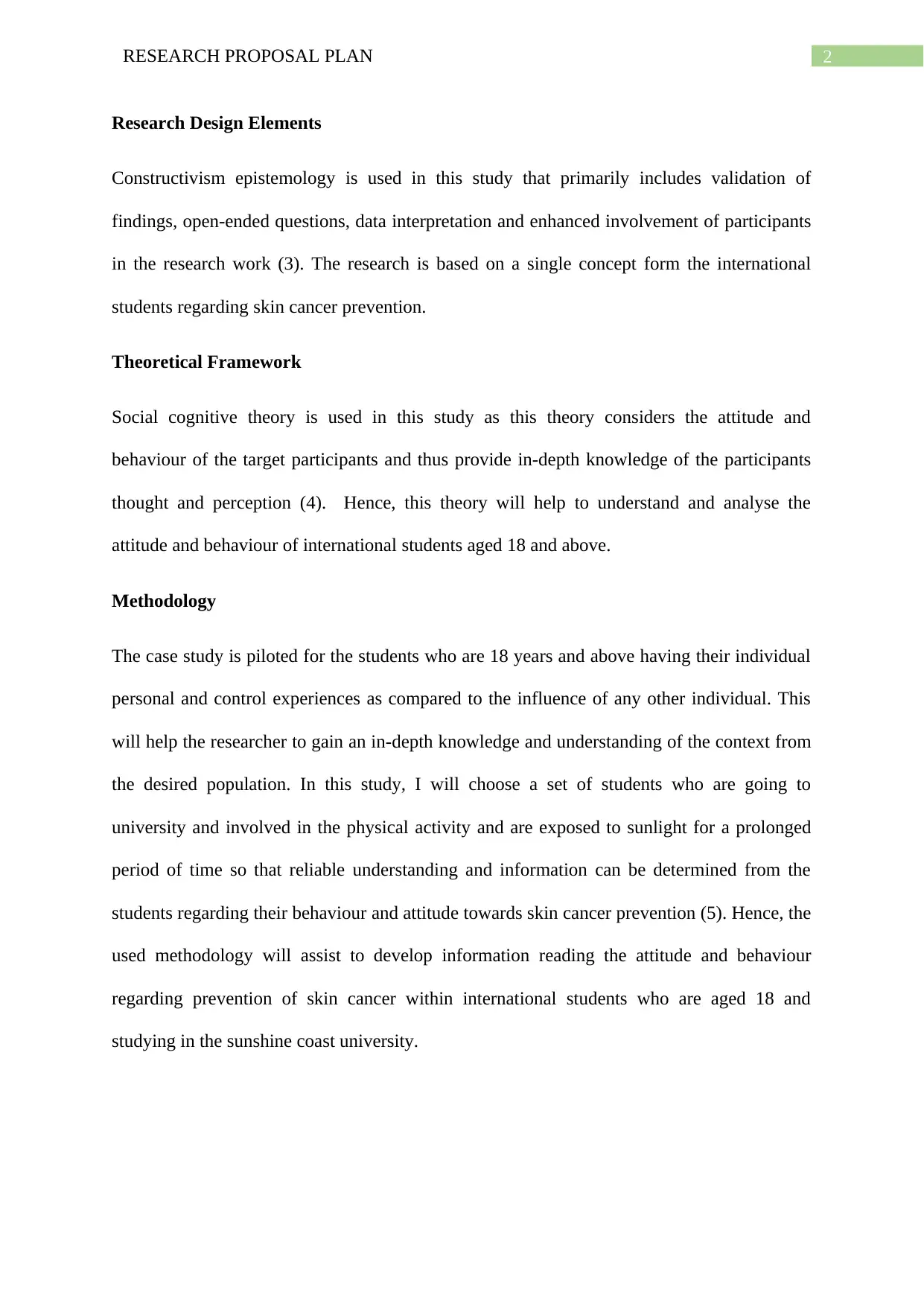
2RESEARCH PROPOSAL PLAN
Research Design Elements
Constructivism epistemology is used in this study that primarily includes validation of
findings, open-ended questions, data interpretation and enhanced involvement of participants
in the research work (3). The research is based on a single concept form the international
students regarding skin cancer prevention.
Theoretical Framework
Social cognitive theory is used in this study as this theory considers the attitude and
behaviour of the target participants and thus provide in-depth knowledge of the participants
thought and perception (4). Hence, this theory will help to understand and analyse the
attitude and behaviour of international students aged 18 and above.
Methodology
The case study is piloted for the students who are 18 years and above having their individual
personal and control experiences as compared to the influence of any other individual. This
will help the researcher to gain an in-depth knowledge and understanding of the context from
the desired population. In this study, I will choose a set of students who are going to
university and involved in the physical activity and are exposed to sunlight for a prolonged
period of time so that reliable understanding and information can be determined from the
students regarding their behaviour and attitude towards skin cancer prevention (5). Hence, the
used methodology will assist to develop information reading the attitude and behaviour
regarding prevention of skin cancer within international students who are aged 18 and
studying in the sunshine coast university.
Research Design Elements
Constructivism epistemology is used in this study that primarily includes validation of
findings, open-ended questions, data interpretation and enhanced involvement of participants
in the research work (3). The research is based on a single concept form the international
students regarding skin cancer prevention.
Theoretical Framework
Social cognitive theory is used in this study as this theory considers the attitude and
behaviour of the target participants and thus provide in-depth knowledge of the participants
thought and perception (4). Hence, this theory will help to understand and analyse the
attitude and behaviour of international students aged 18 and above.
Methodology
The case study is piloted for the students who are 18 years and above having their individual
personal and control experiences as compared to the influence of any other individual. This
will help the researcher to gain an in-depth knowledge and understanding of the context from
the desired population. In this study, I will choose a set of students who are going to
university and involved in the physical activity and are exposed to sunlight for a prolonged
period of time so that reliable understanding and information can be determined from the
students regarding their behaviour and attitude towards skin cancer prevention (5). Hence, the
used methodology will assist to develop information reading the attitude and behaviour
regarding prevention of skin cancer within international students who are aged 18 and
studying in the sunshine coast university.
⊘ This is a preview!⊘
Do you want full access?
Subscribe today to unlock all pages.

Trusted by 1+ million students worldwide
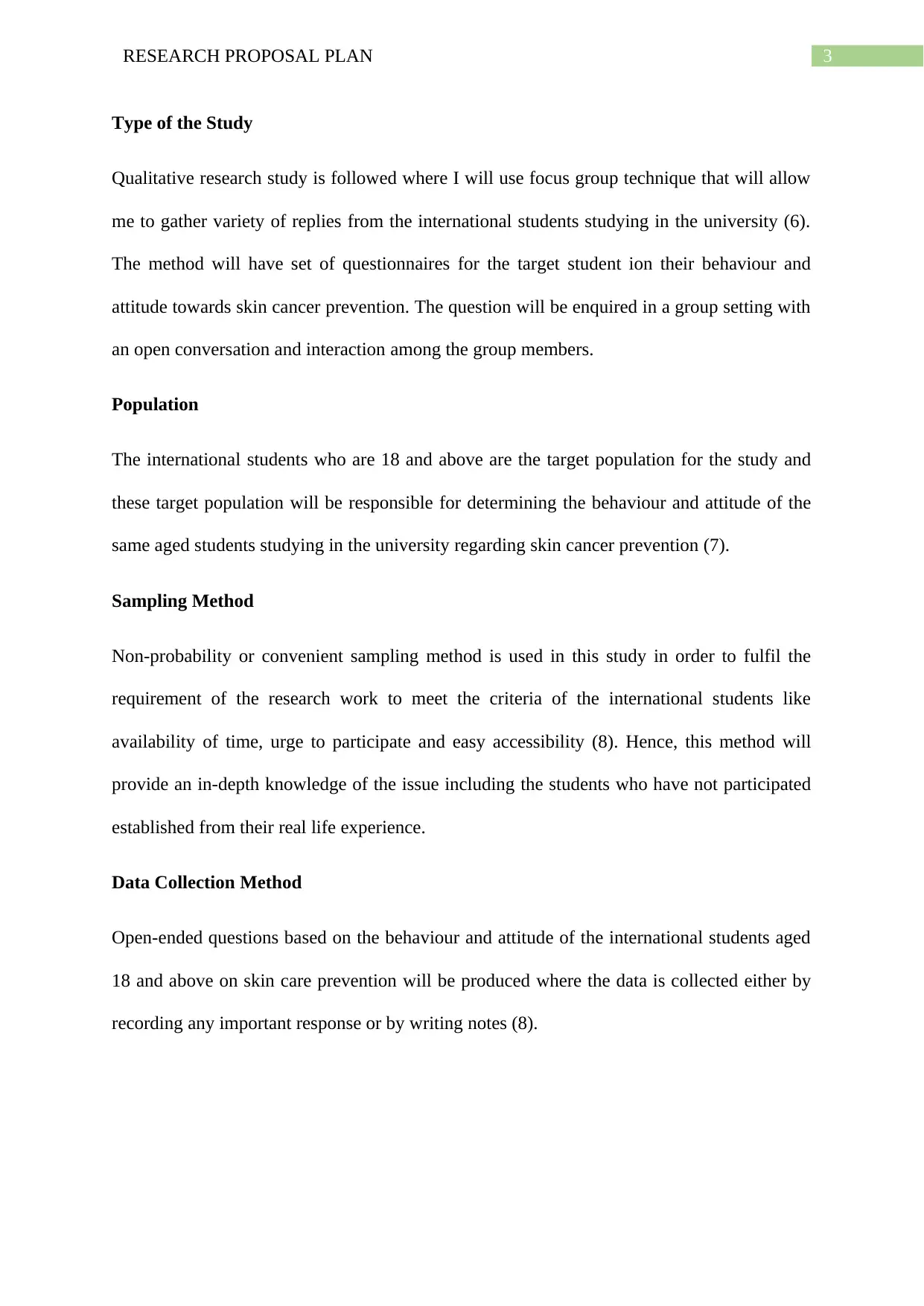
3RESEARCH PROPOSAL PLAN
Type of the Study
Qualitative research study is followed where I will use focus group technique that will allow
me to gather variety of replies from the international students studying in the university (6).
The method will have set of questionnaires for the target student ion their behaviour and
attitude towards skin cancer prevention. The question will be enquired in a group setting with
an open conversation and interaction among the group members.
Population
The international students who are 18 and above are the target population for the study and
these target population will be responsible for determining the behaviour and attitude of the
same aged students studying in the university regarding skin cancer prevention (7).
Sampling Method
Non-probability or convenient sampling method is used in this study in order to fulfil the
requirement of the research work to meet the criteria of the international students like
availability of time, urge to participate and easy accessibility (8). Hence, this method will
provide an in-depth knowledge of the issue including the students who have not participated
established from their real life experience.
Data Collection Method
Open-ended questions based on the behaviour and attitude of the international students aged
18 and above on skin care prevention will be produced where the data is collected either by
recording any important response or by writing notes (8).
Type of the Study
Qualitative research study is followed where I will use focus group technique that will allow
me to gather variety of replies from the international students studying in the university (6).
The method will have set of questionnaires for the target student ion their behaviour and
attitude towards skin cancer prevention. The question will be enquired in a group setting with
an open conversation and interaction among the group members.
Population
The international students who are 18 and above are the target population for the study and
these target population will be responsible for determining the behaviour and attitude of the
same aged students studying in the university regarding skin cancer prevention (7).
Sampling Method
Non-probability or convenient sampling method is used in this study in order to fulfil the
requirement of the research work to meet the criteria of the international students like
availability of time, urge to participate and easy accessibility (8). Hence, this method will
provide an in-depth knowledge of the issue including the students who have not participated
established from their real life experience.
Data Collection Method
Open-ended questions based on the behaviour and attitude of the international students aged
18 and above on skin care prevention will be produced where the data is collected either by
recording any important response or by writing notes (8).
Paraphrase This Document
Need a fresh take? Get an instant paraphrase of this document with our AI Paraphraser
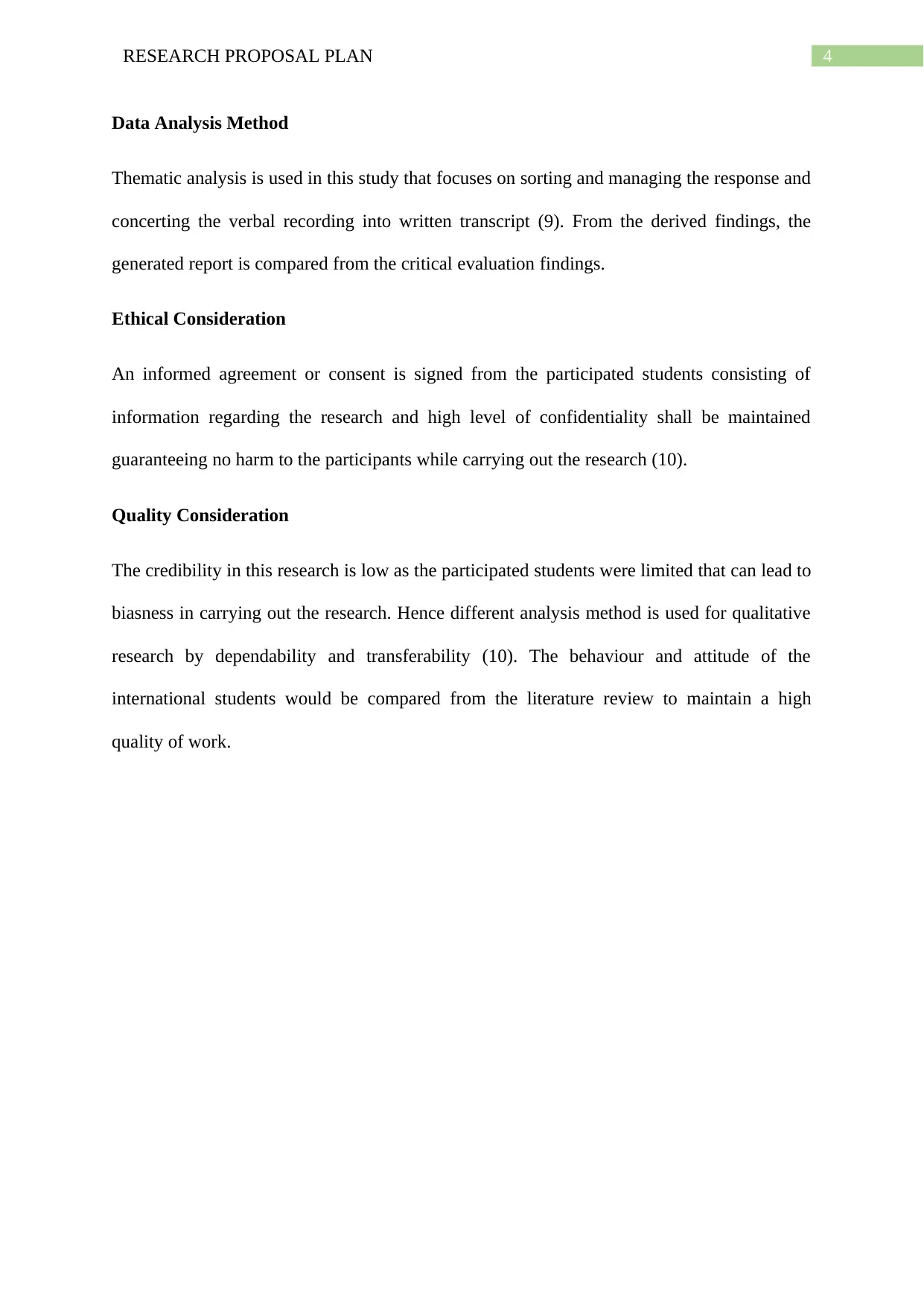
4RESEARCH PROPOSAL PLAN
Data Analysis Method
Thematic analysis is used in this study that focuses on sorting and managing the response and
concerting the verbal recording into written transcript (9). From the derived findings, the
generated report is compared from the critical evaluation findings.
Ethical Consideration
An informed agreement or consent is signed from the participated students consisting of
information regarding the research and high level of confidentiality shall be maintained
guaranteeing no harm to the participants while carrying out the research (10).
Quality Consideration
The credibility in this research is low as the participated students were limited that can lead to
biasness in carrying out the research. Hence different analysis method is used for qualitative
research by dependability and transferability (10). The behaviour and attitude of the
international students would be compared from the literature review to maintain a high
quality of work.
Data Analysis Method
Thematic analysis is used in this study that focuses on sorting and managing the response and
concerting the verbal recording into written transcript (9). From the derived findings, the
generated report is compared from the critical evaluation findings.
Ethical Consideration
An informed agreement or consent is signed from the participated students consisting of
information regarding the research and high level of confidentiality shall be maintained
guaranteeing no harm to the participants while carrying out the research (10).
Quality Consideration
The credibility in this research is low as the participated students were limited that can lead to
biasness in carrying out the research. Hence different analysis method is used for qualitative
research by dependability and transferability (10). The behaviour and attitude of the
international students would be compared from the literature review to maintain a high
quality of work.
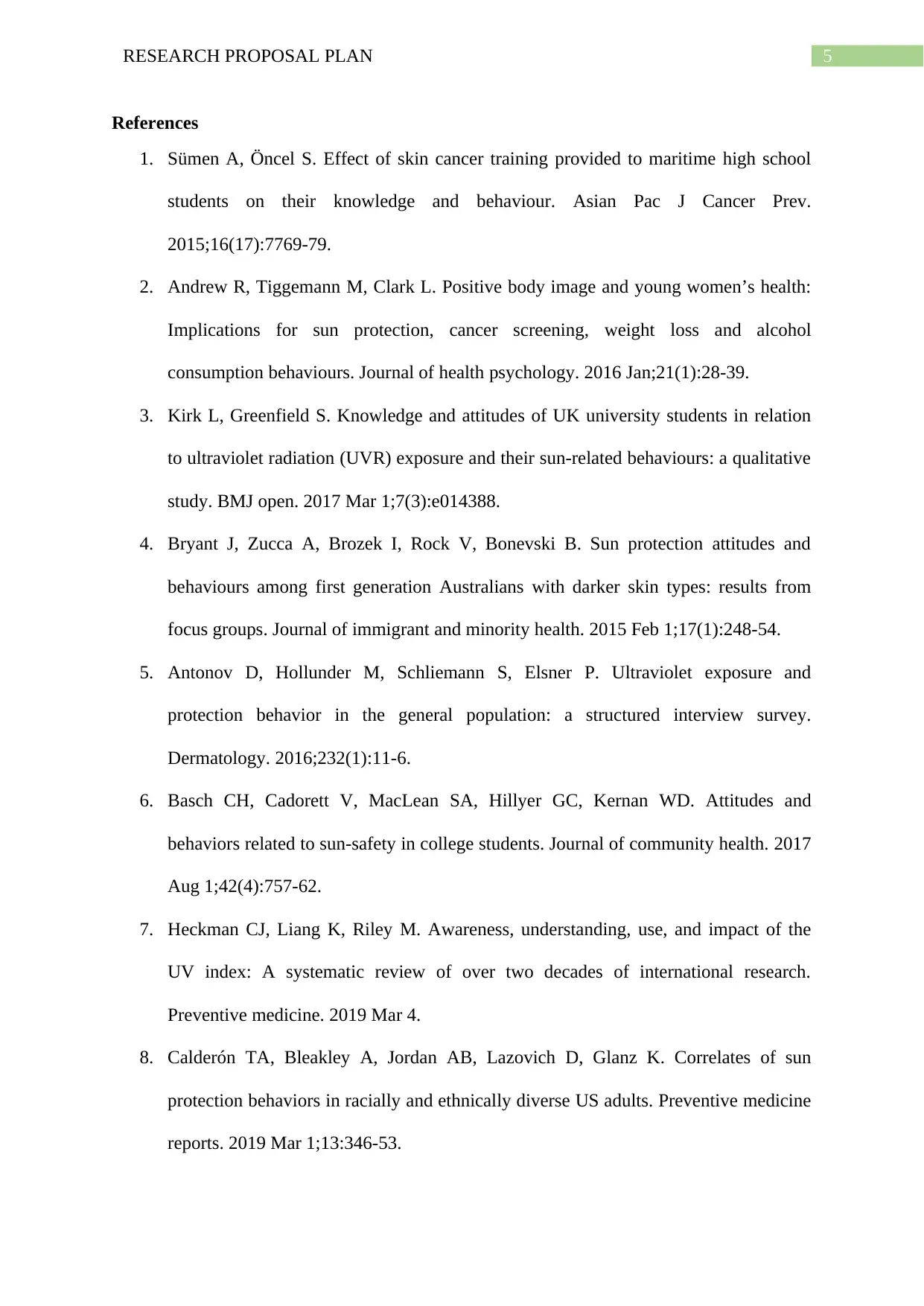
5RESEARCH PROPOSAL PLAN
References
1. Sümen A, Öncel S. Effect of skin cancer training provided to maritime high school
students on their knowledge and behaviour. Asian Pac J Cancer Prev.
2015;16(17):7769-79.
2. Andrew R, Tiggemann M, Clark L. Positive body image and young women’s health:
Implications for sun protection, cancer screening, weight loss and alcohol
consumption behaviours. Journal of health psychology. 2016 Jan;21(1):28-39.
3. Kirk L, Greenfield S. Knowledge and attitudes of UK university students in relation
to ultraviolet radiation (UVR) exposure and their sun-related behaviours: a qualitative
study. BMJ open. 2017 Mar 1;7(3):e014388.
4. Bryant J, Zucca A, Brozek I, Rock V, Bonevski B. Sun protection attitudes and
behaviours among first generation Australians with darker skin types: results from
focus groups. Journal of immigrant and minority health. 2015 Feb 1;17(1):248-54.
5. Antonov D, Hollunder M, Schliemann S, Elsner P. Ultraviolet exposure and
protection behavior in the general population: a structured interview survey.
Dermatology. 2016;232(1):11-6.
6. Basch CH, Cadorett V, MacLean SA, Hillyer GC, Kernan WD. Attitudes and
behaviors related to sun-safety in college students. Journal of community health. 2017
Aug 1;42(4):757-62.
7. Heckman CJ, Liang K, Riley M. Awareness, understanding, use, and impact of the
UV index: A systematic review of over two decades of international research.
Preventive medicine. 2019 Mar 4.
8. Calderón TA, Bleakley A, Jordan AB, Lazovich D, Glanz K. Correlates of sun
protection behaviors in racially and ethnically diverse US adults. Preventive medicine
reports. 2019 Mar 1;13:346-53.
References
1. Sümen A, Öncel S. Effect of skin cancer training provided to maritime high school
students on their knowledge and behaviour. Asian Pac J Cancer Prev.
2015;16(17):7769-79.
2. Andrew R, Tiggemann M, Clark L. Positive body image and young women’s health:
Implications for sun protection, cancer screening, weight loss and alcohol
consumption behaviours. Journal of health psychology. 2016 Jan;21(1):28-39.
3. Kirk L, Greenfield S. Knowledge and attitudes of UK university students in relation
to ultraviolet radiation (UVR) exposure and their sun-related behaviours: a qualitative
study. BMJ open. 2017 Mar 1;7(3):e014388.
4. Bryant J, Zucca A, Brozek I, Rock V, Bonevski B. Sun protection attitudes and
behaviours among first generation Australians with darker skin types: results from
focus groups. Journal of immigrant and minority health. 2015 Feb 1;17(1):248-54.
5. Antonov D, Hollunder M, Schliemann S, Elsner P. Ultraviolet exposure and
protection behavior in the general population: a structured interview survey.
Dermatology. 2016;232(1):11-6.
6. Basch CH, Cadorett V, MacLean SA, Hillyer GC, Kernan WD. Attitudes and
behaviors related to sun-safety in college students. Journal of community health. 2017
Aug 1;42(4):757-62.
7. Heckman CJ, Liang K, Riley M. Awareness, understanding, use, and impact of the
UV index: A systematic review of over two decades of international research.
Preventive medicine. 2019 Mar 4.
8. Calderón TA, Bleakley A, Jordan AB, Lazovich D, Glanz K. Correlates of sun
protection behaviors in racially and ethnically diverse US adults. Preventive medicine
reports. 2019 Mar 1;13:346-53.
⊘ This is a preview!⊘
Do you want full access?
Subscribe today to unlock all pages.

Trusted by 1+ million students worldwide
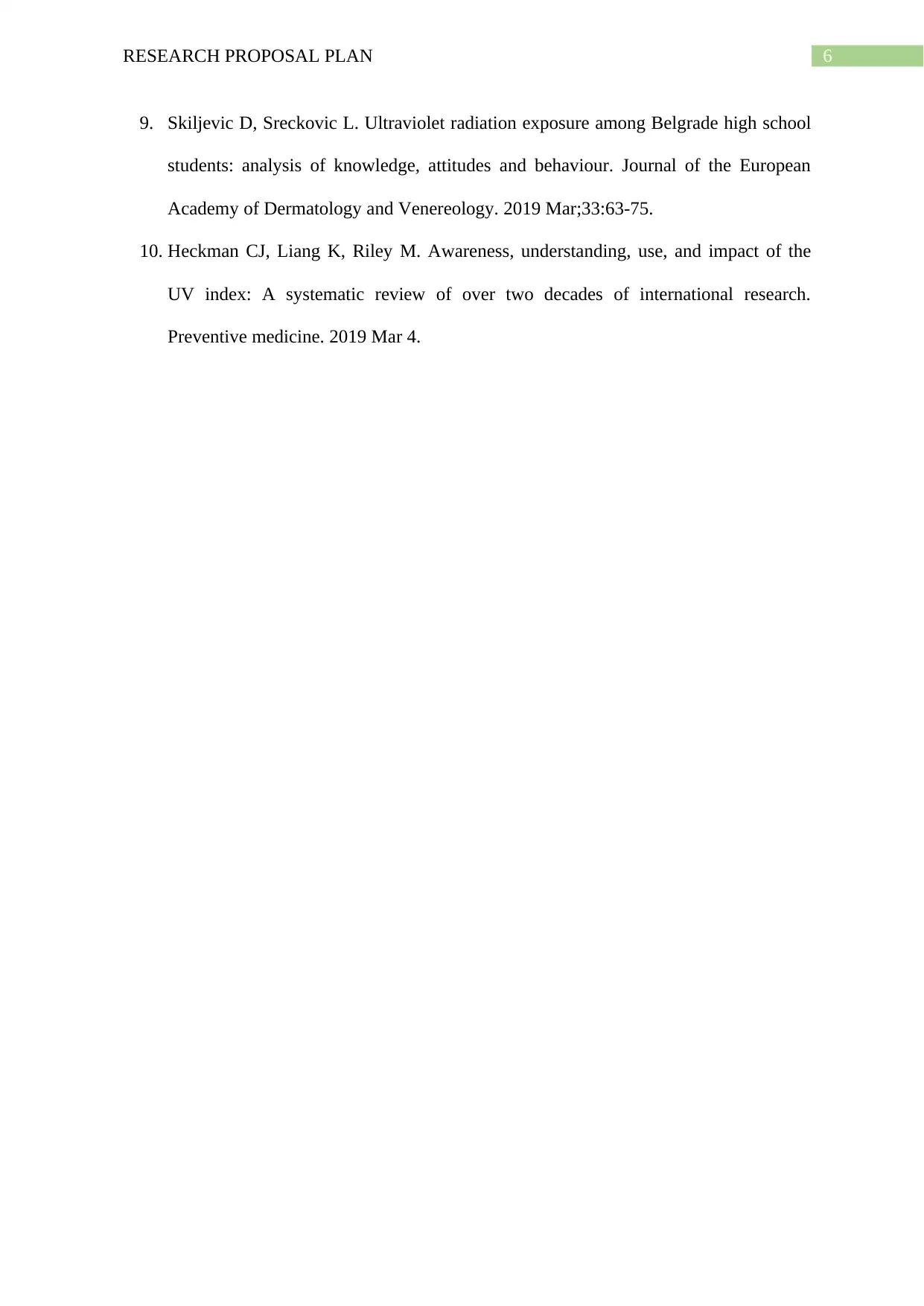
6RESEARCH PROPOSAL PLAN
9. Skiljevic D, Sreckovic L. Ultraviolet radiation exposure among Belgrade high school
students: analysis of knowledge, attitudes and behaviour. Journal of the European
Academy of Dermatology and Venereology. 2019 Mar;33:63-75.
10. Heckman CJ, Liang K, Riley M. Awareness, understanding, use, and impact of the
UV index: A systematic review of over two decades of international research.
Preventive medicine. 2019 Mar 4.
9. Skiljevic D, Sreckovic L. Ultraviolet radiation exposure among Belgrade high school
students: analysis of knowledge, attitudes and behaviour. Journal of the European
Academy of Dermatology and Venereology. 2019 Mar;33:63-75.
10. Heckman CJ, Liang K, Riley M. Awareness, understanding, use, and impact of the
UV index: A systematic review of over two decades of international research.
Preventive medicine. 2019 Mar 4.
1 out of 7
Related Documents
Your All-in-One AI-Powered Toolkit for Academic Success.
+13062052269
info@desklib.com
Available 24*7 on WhatsApp / Email
![[object Object]](/_next/static/media/star-bottom.7253800d.svg)
Unlock your academic potential
Copyright © 2020–2026 A2Z Services. All Rights Reserved. Developed and managed by ZUCOL.





